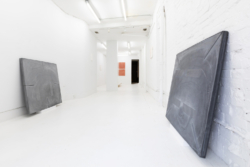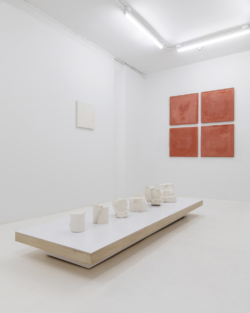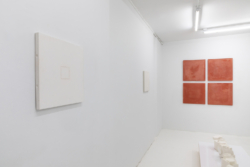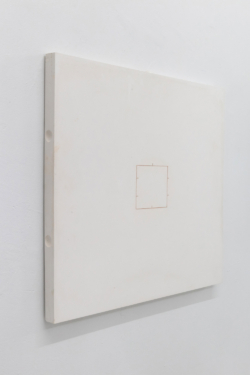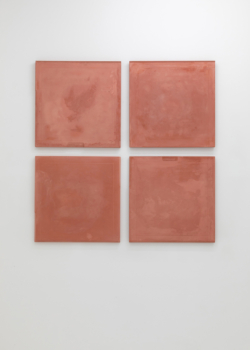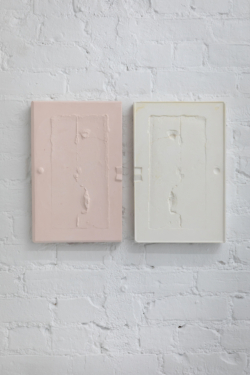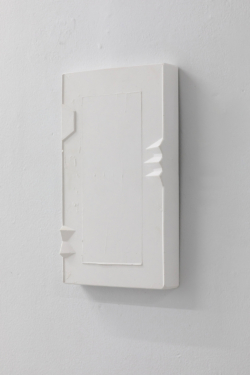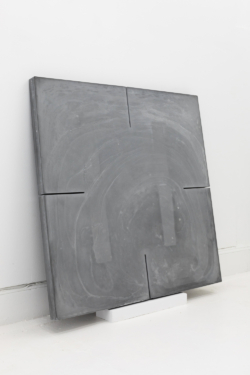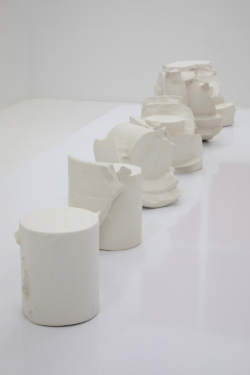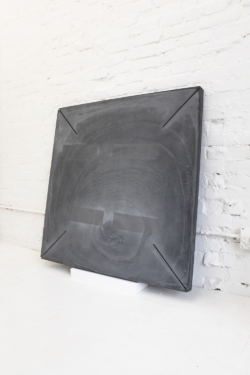Hae Won Sohn
January 17 – February 23, 2020
Opening reception – January 17, 6 pm – 8 pm
Emmanuel Barbault Gallery is pleased to announce Monologue aside, a solo exhibition by Hae Won Sohn. This will be Hae Won Sohn’s first solo show with Emmanuel Barbault Gallery.
Monologue aside is an exhibition where the fundamental principles around ceramics act as a direct linear narrative for intervention. Hae Won Sohn’s casted objects align with process based practices that employ a systematized process. The pieces in the exhibition challenge the method from which artists extract forms by using alternative or counter means found in traditional mold making. The work brings attention to the distinction between process based ceramics and artists’ methods in which autonomy influences object making.
The language of materials is the relationship between elements and other objects; its accounts are relational to the division of the perceived use. By lifting the proscenium frame, one can communicate a receptiveness that is amenable to the medium and the viewer’s experience.
Hae Won Sohn’s work invokes a clear discernment of practice and familiarity surrounding object making. Sohn’s practice offers the possibility of open and discursive dialogue around artistic modes and non-traditional approaches to traditional materials.
Trained in Kookmin University (Seoul, South Korea) under the instruction of Sewon Minn, Hae Won Sohn was able to develop a strong and diverse foundational skill set in ceramics. Readily eager to take a new direction, Sohn attended graduate studies at Cranbrook Academy of Art (Bloomfield Hills, MI). Sohn’s contemplative mold making process is fueled by the tension between moving away from cylinder ceramic forms and looking at the ceramic process as an unknown.
While attending an internship at the ceramic residency and research center Sunday Morning @ekwc (The Netherlands), she had the opportunity to work with several visual artists who work in different disciplines that had little knowledge in ceramics. The trajectory of working with artists in this context helped her to establish an interventional approach to the medium, an excuse for Sohn to challenge the concept of craft.
Embracing the mistake within a craft influenced medium, Sohn was able to manifest it through ideas of labor and practice. An earlier work “Fraternal Centuples,” a commentary on the cast vessel where Sohn created 101 separate plaster molds reaching 101 unique multiples by breaking each mold, extending the critique of craft beyond simple ideas of form and commentary on utilitarianism. Hae Won Sohn works within a medium serially, where a certain amount of decision-making is being deferred through a process-based medium and its aesthetics.
Sohn’s objects manifest around the remnant, utilizing the broken mold and incorporating action of breaking as a natural phenomenon in ceramics. Her work aims to decipher between what’s natural and the systems that reinforce such structural ideas. Utilizing basic shapes, in all their aspects and formal and structural possibilities is a nod to antiquity, not as the perception of stagnation of fundamental concepts but the means from which we situate to perceive those ideas.
Sohn’s use of synchronicity of surface treatments introduces techniques that resemble the systematic approach she utilizes in creating forms. Her dimensional approach to the extracted forms differs from traditional cylinder formed vessels, creating an interregnal autonomous object by integrating elements found throughout the process of mold making. Sohn’s appropriation of mold making elements like the use of registration keys, a function of the plaster mold to keep the mold aligned, becomes architectural moments incorporated into her objects. She utilizes controlled breaks in the mold to create new forms, allowing intervention and chance to integrate into form-making. Sohn’s works are reflective of constructivism, an approach based on the assigned relationship of constructed knowledge through a process-based practice.
The shelf, the pedestal, the table become a prop for our relation to situate ceramics, this topographical space that this medium occupies reinforces the perception of its fragility. Hae Won Sohn’s flat surface works are hung, propped against the wall, or placed on the floor. The mere physicality demonstrates the consciousness of her process and her ability to influence crafts-based aesthetics. Her most recent pieces are made from pigmented hydrocal the 40inch squared dimensions ascertain a certain physicality that relates to body and labor, and also reinforces Sohn’s approach to extracted form as a singular, autonomous experience.
– Rod Malin, 2019
Rod Malin is a Baltimore/NYC-based artist, curator, and educator who holds a self-accredited Ph.D. in contextual theory and liminal cultural studies. Malin is a founder and director of Guest Spot @ THE REINSTITUTE (Baltimore), Co-Founder Transmitter Gallery Brooklyn, NY, and Co-Director MONO Practice (Baltimore).
Hae Won Sohn (b.1992) is a visual artist/sculptor, currently living in Baltimore, MD and working between Baltimore and New York. Sohn’s recent practice examines the wholeness of fragmented and extractive forms, and their evolution through repetitional casting. Coming from Seoul, South Korea; Sohn earned her Master of Fine Arts degree at Cranbrook Academy of Art. Prior to Cranbrook, she achieved her Bachelor of Fine Arts degree in Ceramics from the College of Design at Kookmin University located in Seoul.
Sohn has been selected as a finalist for the inaugural 2019 Galerie Emerging Artist Award). Her work has been exhibited internationally at venues including Emmanuel Barbault Gallery, New York, NY; Gray Contemporary, Houston, TX; MONO Practice, Baltimore, MD; Next Step Studio & Gallery, Ferndale, MI; Zahoorul Akhlaq Gallery of National College of Arts, Lahore, Pakistan; and Kyung-In Museum of Fine Art, Seoul, South Korea.

